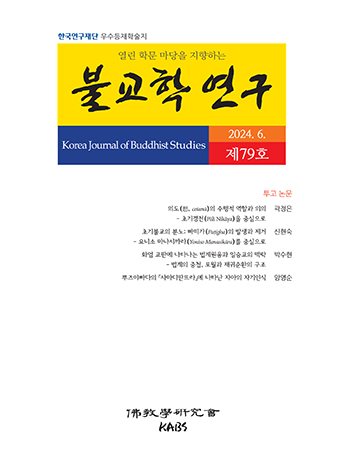Abstract
References
Sorry, not available.
Click the PDF button.
Information
This thesis attempts to explain Ta-hui Tsung-Kao(大慧宗杲: 1089-1163)'s view on scholar officials’ learning(學問). The targets of Ta-hui criticism are not limited to Ch'an Buddhism of the time. It targets the entire intellectual currents of the time. I believe, therefore, that the research on Ta-hui's criticism on the intellectual currents of the time is indispensible, as we investigate Ch'an's contribution on the development of the learning in Sung. Ta-hui criticised scholars' learning for the state examination and their indifference in relating their study to the social issues of the time. With regard to the learning method, he was against their fragmented thinking, deficiency of self reflection, and noncritical readings. He diagnosed that all their problems originated from their negligence of self-reflection and insufficiency of self confidence. Thereupon, he suggested “seeing Ch'an's self-original perfect nature(見本來面目)" as the treatment for their problems. As it were, he exhorted scholar officials to practice mind cultivation of Ch'an. This new way of learning suggested by Ta-hui includes social engagement of Confucianism as well as mind cultivation of Ch'an. In this regard, I would like to call Ta-hui's learning as “Confucian-Ch'an learning", and his Tao as “Social Everyday Mind(社會的 平常心是道)". In conclusion, I would like to say that his criticism on scholar officials' learning is the fundamental criticism on the studying method of the time and that it also initiated intellectual discourses on this topic.Ta-hui's actual concern was on “the problem of man", when he talked about the problem of learning. At this point, he stands on the same ground of the Taoxué-movement(道學運動) in Sung dynasty. He made efforts not for the renovation of mind cultivation-method, but for the renewal of learning in Sung.
Click the PDF button.
- Publisher :Korean Association of Buddhist Studies
- Publisher(Ko) :불교학연구회
- Journal Title :Korea Journal of Buddhist Studies
- Journal Title(Ko) :불교학연구
- Volume : 8
- No :0
- Pages :217~ 244


 Korea Journal of Buddhist Studies
Korea Journal of Buddhist Studies






